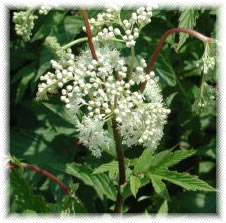|
|
|
|
| Common Names : Chinese Angelica, Dang-gui |
| Actions: Optimize female hormones |
| Medicinal Uses:menstrual disorders, blood tonic, circulation-enhancing, pain-relieving, tranquilizing, and liver-protecting, strengthens the immune system |
| Parts Used: root |
| Constituents:Butylidene phhtalide, ligustilide, n-butylidene-phthalide, sequiterpenes, carvacrol, dihyrophthalic anhydride, sucrose, B vitamins, beta-sitosterol |
|

Dong quai has been used in traditional Chinese medicine since the writing of the Divine Husband's Classic of the Materia Medica,over two thousand years ago. It was believed then and now that dong quai to help women return to their natural hormonal states, setting the stage for responsiveness to sexual desire. Sexual pleasure, particularly orgasmic intensity, may be enhanced with the use of dong quai.
Dong quai contains many nutrients, from metals like cobalt, copper and manganese, to plant sterols, which have similar chemical structures to human hormones like estrogen. Among the active medicinal ingredients are coumarins, essential oils, and various flavonoids. For menopausal women it addresses symptoms such as hot flashes, night sweats and mood swings.
Dong quai, or dan-gui is one of nine species of angelica, part of the parsley family. European varieties include Angelica officinalis or Angelica archangelica, the american variety is Angelica atropurpurea but it is the Chinese and Japanse varient, sinesis, (of China) that is the most valued and studied.
|
|
Preparation Methods :1 to 3 tablespoons of fresh root, 2 to 6 grams of dried root, or 1 teaspoon to 1 tablespoon liquid extract daily. The sliced root is easier to work with than the whole.
|
|
 Buy Bulk Organic Dong Quai Buy Bulk Organic Dong Quai
|
| Side Effects: |
|---|
| Not for use while pregnant or if you have an acute viral infection. May stimulate bleeding. If taken over long period of time, it is suggested discontinue use during the monthly menstrual cycle. |
|
|
|
|
|
|